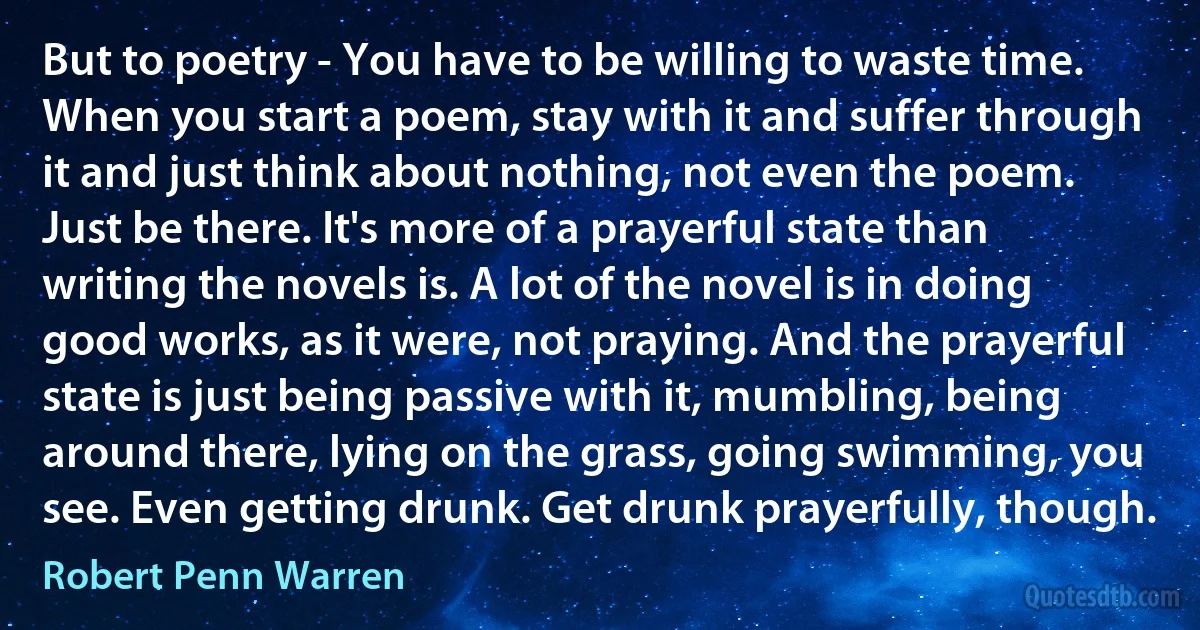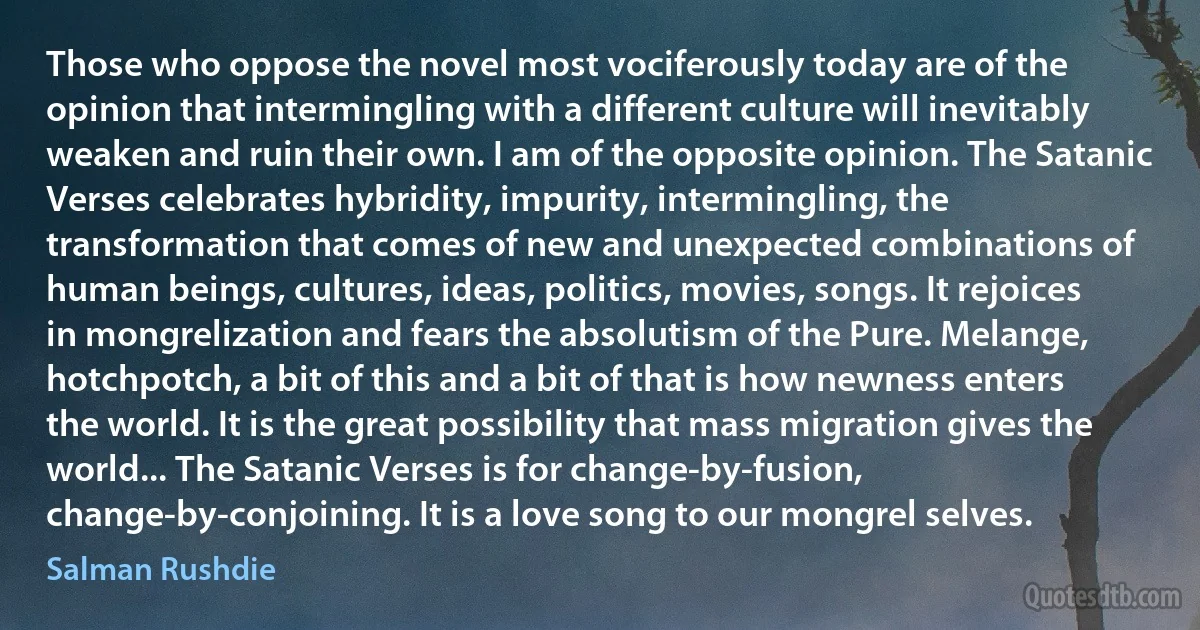Novel Quotes - page 59
In autumn 2011 on BBC Radio 4 BBC produced a 13-episode radio play based on the novel "Life and Fate" which became a bestseller in the U.K. In Russia in 2012, the novel was filmed as a television series that aired nationally. Its premiere was successful of the audience: according to research firm TNS Russia, bringing in about 20 percent of Moscow viewers 18 and over.

Vasily Grossman
I never keep a fixed schedule. I like to write for a while, move around, read, drink something, come back. But when I've entered the world of the novel, that demands more concentration. It's hard to even write a letter, because it means leaving that world. To put aside the typewriter and take out letter paper, or stop because you have to pay the phone bill, is terrible...

Reinaldo Arenas
I do not see this novel as solely dealing with LGBT issues. I see Sirena as a metaphoric representation of the whole Caribbean. The fact that s/he is a transvestite is just a fact. Basically, I did what Flaubert did with Emma Bovary. He talked about his society through the character of a woman-an adulterous woman...

Mayra Santos-Febres
A novel is never anything but a philosophy put into images. And in a good novel, the whole of the philosophy has passed into the images. But if once the philosophy overflows the characters and action, and therefore looks like a label stuck on the work, the plot loses its authenticity and the novel its life. Nevertheless, a work that is to last cannot dispense with profound ideas. And this secret fusion between experiences and ideas, between life and reflection on the meaning of life, is what makes the great novelist.

Albert Camus
This congeniality is another illusion. I loathe Gogol's moralistic slant, I am depressed and puzzled by his utter inability to describe young women, I deplore his obsession with religion. Verbal inventiveness is not really a bond between authors, it is merely a garland. He would have been appalled by my novels and denounced as vicious the innocent, and rather superficial, little sketch of his life that I produced twenty-five years ago. Much more successful, because based on longer and deeper research, was the life of Chernyshevski (in my novel The Gift), whose works I found risible, but whose fate moved me more strongly than did Gogol's. What Chernyshevski would have thought of it is another question-- but at least the plain truth of documents is on my side. That, and only that, is what I would ask of my biographer-- plain facts, no symbol-searching, no jumping at attractive but preposterous conclusions, no Marxist bunkum, no Freudian rot.

Vladimir Nabokov
At some point, I stopped and made the following note to myself: I have never finished a story. I'm beginning to see that now. I don't think that there's ever a point where a story or novel is just exactly right. There are only finer and lesser degrees of refinement, and even those are probably subjective. You might think it's perfect for a time, but read it a year or five years later, and you'll see you were mistaken. There's always something I can make better, every time I read one of my stories. Usually there are dozens of somethings. And I once thought this wasn't true, that a story reached a certain point and beyond that point you were only changing things, making them different, not making them better. Indeed, I thought, beyond a point, you risk screwing it all up. I don't think that anymore. You risk screwing it all up right from the start, and no story is ever as perfect as it can be. Perfection is always one or two polishes away from the writer.

Caitlín R. Kiernan
...I grew up in Ponce where all our domestic service was black. I always had a lot of contact with them, and to a degree they gave me the kind of love that my family denied me. And so I have that sympathy-or empathy-for la gente de color (people of color), and I cannot help it. However, I do not like to create archetypes. If it is possible to break down a novel into archetypes, it is not a good novel...

Rosario Ferré
History, I was learning, is the story we tell ourselves about what really happened. My task as a writer/novelist was to try to get as many versions of that reality and then imaginatively construct the story. The fact that there were so many versions of what really happened should not surprise us: After all, we experience history as individuals through our particular characters, personalities, points of view. This reality of how we live history ideally suits the form of a novel, which focuses on "the truth according to character.

Julia Alvarez
I am at the moment trying to write a novel, a combat novel, which, in addition to being a work which tells the truth about warfare as I saw it, would free all these young men from the horseshit which has been engrained in them by my generation. I don't think that combat has ever been written about truthfully; it has always been described in terms of bravery and cowardice. I won't even accept these words as terms of human reference any more. And anyway, hell, they don't even apply to what, in actual fact, modern warfare has become.

James Jones
The only time I've ever learned anything from a review was when John Lanchester wrote a piece in the Guardian about my second novel, The Heather Blazing. He said that, together with the previous novel, it represented a diptych about the aftermath of Irish independence. I simply hadn't known that – and I loved the grandeur of the word "diptych". I went around quite snooty for a few days, thinking: "I wrote a diptych."

Colm Tóibín
I wouldn't want to be labelled a Woman Writer even though I'm definitely not a man. And I think Scottish Writer has some unfortunate associations.
Last century when I was commissioned to write my first novel, Scottish writers were being bullied by a purple nosed publisher to write in dialect. Well my voice is authentically Scottish. I'm an educated Scottish person who escaped. My voice is as valid as a whiny cunt who lives in a council flat and doesn't quite speak English. That doesn't mean I have to sound like Evelyn Waugh either.
I'd like to be called a Good Writer. To quote a review on Amazon, "Carole Morin is a Fucking Genius. Fact." Fucking Genius will do.

Carole Morin
Panˈdemik/: pan means "all"; demic (or demographic) means "people." It is well-named, because pandemic flu spreads easily throughout the world. Unlike seasonal flu, pandemics occur when a completely new or novel virus emerges. This sort of virus can emerge directly from animal reservoirs or be the result of a dramatic series of mutations -- so-called reassortment events -- in previously circulating viruses. In either case, the result is something mankind has never seen before: a pathogen that can spread easily from person to defenseless person, our immune systems never primed to launch any sort of defense.

Sanjay Gupta
You don't write a novel out of sheer pity any more than you blow a safe out of a vague longing to be rich. Compassion is all to the good, but vindictiveness is the verity Faulkner forgot: the organic force in every creative effort, from the poetry of Villon to the Brinks Express Robbery, that gives shape and color to all our dreams. [...] A certain ruthlessness and a sense of alienation from society is as essential to creative writing as it is to armed robbery. The strong-armer isn't out merely to turn a fast buck any more than the poet is out solely to see his name on the cover of a book, whatever satisfaction that event may afford him. What both need most deeply is to get even. And, of course, neither will.

Nelson Algren
It shouldn't surprise me that Nelson Algren, clearly one of the best novelists of his time, is not much read these days. It's the "kill the messenger" syndrome, I suppose, for the news that Algren's works brings us is not good news: if the world he describes is at all like our own, then it's not morning in America, and it hasn't been for a long, long time. In an Algren novel or story, the only thing that trickles down to where most folks live is disdain, violence and sometimes, on a good day, benign neglect; [...].

Nelson Algren
So much fantasy relies on the author's having read Fraser's The Golden Bough or Robert Graves' The White Goddess and nothing else. The White Goddess is a crank book, a crank book of genius of course, but all the same... Mind you, I found Waking the Moon cited in an article in a pagan magazine as an authority for the idea that there was a patriarchal brotherhood, the Benandanti, that have been running things since antiquity, with no mention of the fact that it is a novel, and a fantasy at that. People want to believe something, and so they swallow anything.

Elizabeth Hand
The life, no matter how traumatic, never explains the work, if the work is any good. W. B. Yeats, Ezra Pound, Doris Lessing, and Saul Bellow variously believed in faeries, funny money, flying saucers, and orgone energy accumulation, but so have millions of other people who never got around to writing even a mediocre poem or novel.

John Leonard (critic)
I am not writing to make people feel warm and comfortable. When my readers enter the world of my book I want them to feel like they can find a place to belong in my story. But it is not their story, and the language is familiar but it is not their language. It is a novel about belonging and it is a novel about difference, too.'

Melissa Lucashenko
Dick Stuart took a look at Roberto Clemente slashing line drives one day and made a pertinent observation. "There must be the best 169-pound slugger in baseball,” Stuart said of the Pirate right fielder. Clemente lost some weight during the winter in his native Puerto Rico and never has been able to regain it. But he hasn't lost his fierce swing... He was leading the Pirates not only in batting but also in RBIs with 23, and of his three homers, two went to right field, indicating his power to all fields. Clemente slammed a homer into the right field stands in Pittsburgh [on May 9th] and also performed the novel feat of drilling one over the right field wall in Philadelphia [on May 19th].

Roberto Clemente
The more I have thought about Figures of Earth - and its sequel The Silver Stallion - the more remarkable they have come to seem. Looking back, one can now understand the abrupt fluctuations of Cabell's fame. ... Published when Cabell was forty-two, the chronicle of Manuel the Redeemer was not a book for the Young nor was it a book in the mood of the twenties. The story of the ambitious man of action who is cowardly, malignant and treacherous and who does not even enjoy very much what his crimes and double-dealing have won him, but who is rapidly, after his death, transformed into a great leader, a public benefactor and a saint, has the fatal disadvantage for a novel that the reader finds no inducement to identify himself with its central figure. Yet I am now not sure that this merciless chronicle in which all the values are negative except the naked human will, is not one of the best things of its kind in literature - on a plane, perhaps, with Flaubert and Swift.

Edmund Wilson



